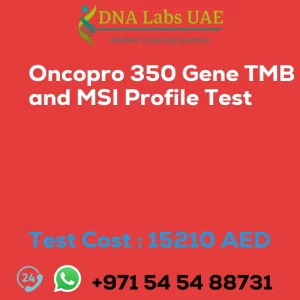PMS2 Gene Colorectal Cancer Hereditary Nonpolyposis Type 4 Genetic Test
Test Name: PMS2 Gene Colorectal Cancer Hereditary Nonpolyposis Type 4 Genetic Test
Components: Blood or Extracted DNA or One drop Blood on FTA Card
Price: 4400.0 AED
Sample Condition: Blood or Extracted DNA or One drop Blood on FTA Card
Report Delivery: 3 to 4 Weeks
Method: NGS Technology
Test Type: Cancer
Doctor: Oncologist
Test Department: Genetics
Pre Test Information: Clinical History of Patient who is going for PMS2 Gene Colorectal Cancer, Hereditary Nonpolyposis Type 4 NGS Genetic DNA Test. A Genetic Counselling session to draw a pedigree chart of family members affected with PMS2 Gene Colorectal Cancer, Hereditary Nonpolyposis Type 4 NGS Genetic DNA Test gene PMS2.
Test Details:
The PMS2 gene is one of several genes associated with hereditary nonpolyposis colorectal cancer (HNPCC), also known as Lynch syndrome. Lynch syndrome is an inherited condition that increases the risk of developing colorectal cancer and other types of cancer, including endometrial, ovarian, stomach, and others.
NGS (Next-Generation Sequencing) genetic testing is a type of genetic testing that can analyze multiple genes simultaneously. In the context of colorectal cancer, NGS testing can identify mutations or alterations in genes associated with the disease, including the PMS2 gene. The PMS2 gene is responsible for providing instructions for producing a protein that helps repair mistakes in DNA. Mutations in the PMS2 gene can impair this DNA repair process, leading to an increased risk of developing cancer.
By undergoing NGS genetic testing for the PMS2 gene, individuals with a family history of colorectal cancer or suspected Lynch syndrome can identify if they carry any mutations in the gene. This information can be used to determine the individual’s risk for developing colorectal cancer and other associated cancers, and to guide appropriate surveillance and preventive measures.
It is important to note that genetic testing should be done in consultation with a healthcare professional or genetic counselor who can provide guidance on the appropriateness of testing, interpretation of results, and implications for the individual and their family.
| Test Name | PMS2 Gene Colorectal cancer hereditary nonpolyposis type 4 Genetic Test |
|---|---|
| Components | |
| Price | 4400.0 AED |
| Sample Condition | Blood or Extracted DNA or One drop Blood on FTA Card |
| Report Delivery | 3 to 4 Weeks |
| Method | NGS Technology |
| Test type | Cancer |
| Doctor | Oncologist |
| Test Department: | Genetics |
| Pre Test Information | Clinical History of Patient who is going for PMS2 Gene Colorectal cancer, hereditary nonpolyposis type 4 NGS Genetic DNA Test. A Genetic Counselling session to draw a pedigree chart of family members affected with PMS2 Gene Colorectal cancer, hereditary nonpolyposis type 4 NGS Genetic DNA Test gene PMS2 |
| Test Details |
The PMS2 gene is one of several genes associated with hereditary nonpolyposis colorectal cancer (HNPCC), also known as Lynch syndrome. Lynch syndrome is an inherited condition that increases the risk of developing colorectal cancer and other types of cancer, including endometrial, ovarian, stomach, and others. NGS (Next-Generation Sequencing) genetic testing is a type of genetic testing that can analyze multiple genes simultaneously. In the context of colorectal cancer, NGS testing can identify mutations or alterations in genes associated with the disease, including the PMS2 gene. The PMS2 gene is responsible for providing instructions for producing a protein that helps repair mistakes in DNA. Mutations in the PMS2 gene can impair this DNA repair process, leading to an increased risk of developing cancer. By undergoing NGS genetic testing for the PMS2 gene, individuals with a family history of colorectal cancer or suspected Lynch syndrome can identify if they carry any mutations in the gene. This information can be used to determine the individual’s risk for developing colorectal cancer and other associated cancers, and to guide appropriate surveillance and preventive measures. It is important to note that genetic testing should be done in consultation with a healthcare professional or genetic counselor who can provide guidance on the appropriateness of testing, interpretation of results, and implications for the individual and their family. |








